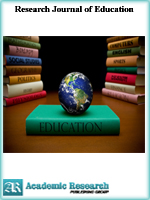Research Journal of Education
Online ISSN: 2413-0540
Print ISSN: 2413-8886
Print ISSN: 2413-8886
Quarterly Published (4 Issues Per Year)

Archives
Volume 2 Number 3 March 2016
Introducing Climate Change in Non Formal Education Sector in Nigeria: Instructors? Perspective
Authors: Stella N. Nwosu ; Glory Ofili
Pages: 38-45
Abstract
The non-formal educational sector in Nigeria encompasses a variety of citizenry, across the rural and urban settings. Evidently, this educational sector can be a key contributor to the dissemination of information on climate change, which is necessary for its mitigation and adaptation. As Nigeria government is incrementally enabling the introduction of a climate change education to the school curriculum, the non-formal education sector engagement is vital. The study herein described is aimed at determining the extent of climate change awareness by the instructors of non- formal education as it is expected to streamline perspectives and understanding of how the individuals and government can contribute to its mitigation and adaptation. A descriptive survey design was used to sample ninety non formal education instructors which were selected through purposive sampling from eighteen non-formal education institutions in Akwa Ibom State, Southern Nigeria. The applied data were gathered by means of the “Non-Formal Education Instructors Climate Change Questionnaire” (NEICCQ). The study results revealed an overall moderate awareness of climate change issues; awareness of mitigation and adaptation measures; with the instructors indicating a need to be more informed on the subject before they can teach it. Thus, our findings led to the conclusion that non- formal education instructors were not sufficiently informed to provide instruction on climate change that can make the required impact on the students and communities. Special training programs on climate change education are needed to be put in place for instructors of the non-formal education sector in order to establish a robust climate change education in this educational sector.
Attitudes of School Children in Germany and Costa Rica towards Invertebrates - A Comparison
Authors: J?rgen Drissner ; Mariangela Simonte ; Katrin Hille
Pages: 34-37
Abstract
Negative feelings and an insufficient awareness of invertebrates seem to be culturally universal and can be found in different countries and continents. To better understand the underlying mechanisms we want to compare the attitudes of school children in Germany and Costa Rica towards invertebrates. The sample of the study comprised a total of 271 school children (grade 4, 5 and 6); 134 Costa Rican students (61 girls, 73 boys) and 137 German students (53 girls, 84 boys). Attitudes towards small animals such as beetles, wood lice, centipedes or spiders were assessed with the help of a semantic differential. Altogether students marked their choices for 13 bipolar adjective pairs that focused on the perceived value of animals and the emotions towards them. Only 3 of the 13 bipolar adjective pairs showed significant differences. Although Costa Rican schoolchildren rated invertebrates more dangerous than German schoolchildren, especially the Costa Rican boys rated the invertebrates more interesting and more precious in comparison with the German students.



